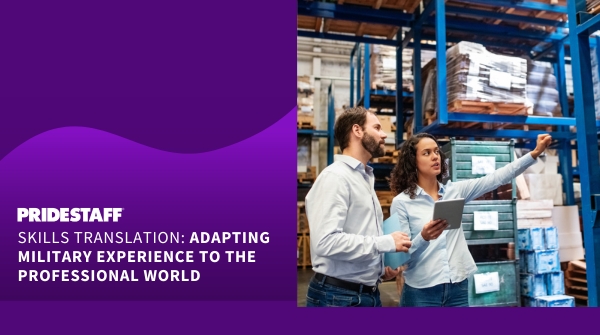Skills Translation: Adapting Military Experience to the Professional World

It’s no secret the military is a fantastic place to learn new skills.
But what happens when your military service ends? The transition from military to civilian life can be difficult, especially if you don’t have a clear idea of what you want to do next.
Good news! There are plenty of opportunities for veterans who are willing to put in the effort to identify how their military skills can be professional assets in the civilian workforce.
Here are five military skills in demand by companies looking to hire veterans:
- Adaptability. From surviving in extreme weather conditions to learning new languages and cultures, soldiers are used to being thrown into new situations. In fact, many companies want to hire veterans like you because they’re better at dealing with change than other candidates. You’ve learned how to quickly adapt when faced with new challenges or situations — whether on the battlefield or in your personal life. In today’s fast-paced business world, adaptability is one of the most valuable skills you can have!
- Communication. Military service requires strong written and oral communication skills, which are critical for communicating with superiors, subordinates, and other branches of the armed forces. Civilian employers prize good communication skills because employees often interact directly with customers and clients through phone calls, emails, or in-person meetings, all of which can impact an organization’s success. Great communication skills can also help you stand out from other job applicants and make a positive impression on potential employers.
- Customer service. Military training teaches people to take action—and be responsible and accountable for those actions—all aspects of good customer service. Your military training has likely also taught you how to interact with people from all walks of life and communicate with people from different backgrounds, skills that will serve you well in customer service roles.
- Problem solving. Military training builds problem-solving skills by teaching soldiers to be flexible, efficient, and resilient. In the military, you learn to make quick decisions under pressure, and practicing doing so until it becomes second nature. This kind of training can be invaluable in the civilian world, where employees are often expected to problem-solve quickly and independently.
- Teamwork. Military training also teaches soldiers how to work well with others by fostering a sense of camaraderie and teamwork. The military is a team-oriented environment, and soldiers are trained to work together to achieve common goals. This kind of training can be invaluable in the civilian world, where employees are often expected to collaborate with others on projects or tasks.
If you’ve had military experience, you know how to communicate effectively with your team members about the best way to accomplish a task. You’ve learned how to recognize when something isn’t working and change course quickly if necessary. And because you’re used to being under pressure while performing tasks, you’re more likely to be able to handle stressful situations in the civilian world.
Looking for a great job where you can make the most of your military training and experience?
Our dedicated veteran career search board can help you uncover exciting civilian opportunities. Contact your local PrideStaff recruiter to get started today!
Related Posts
Navigating the Post-Military Service Job Market
Career Advice for Veterans: How to Transition to Civilian Life



